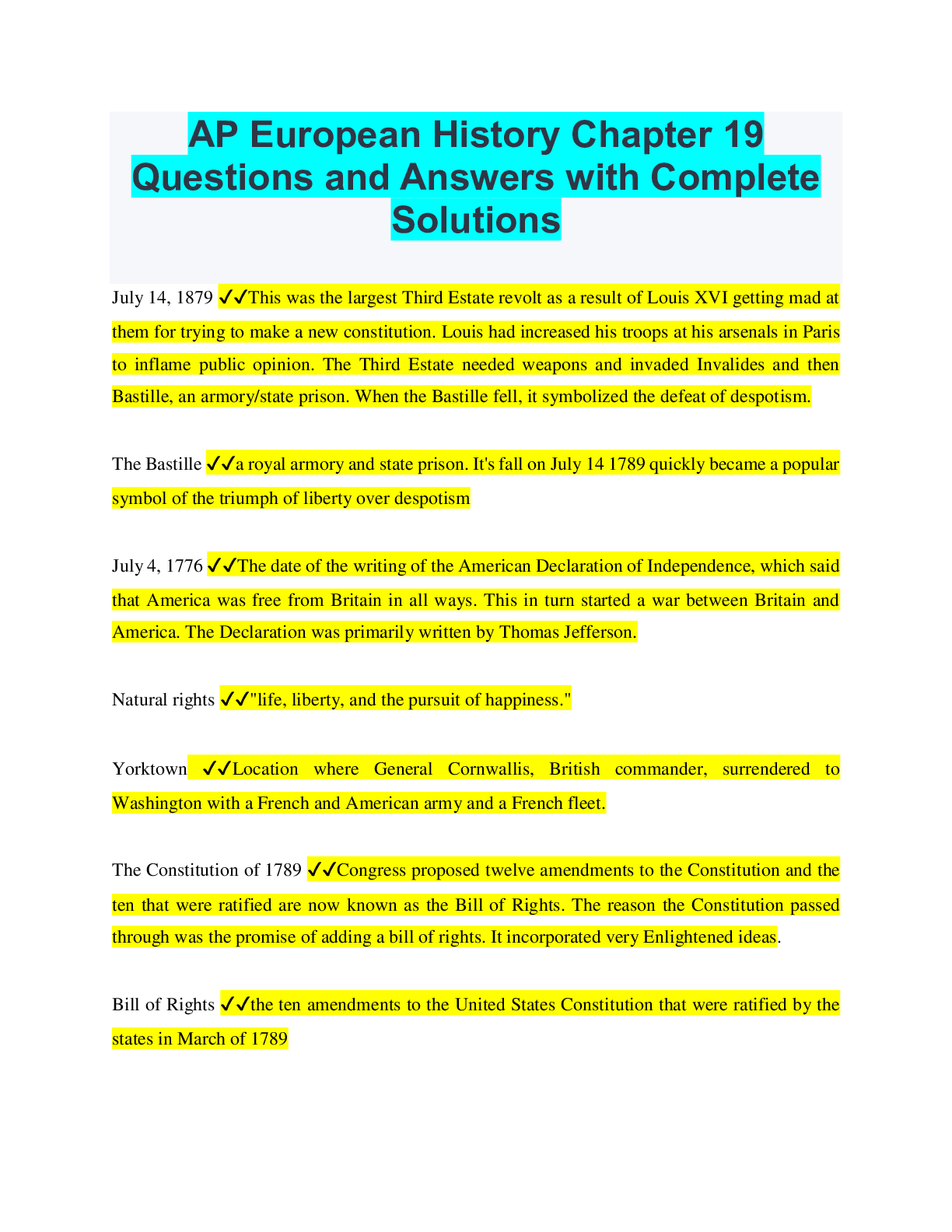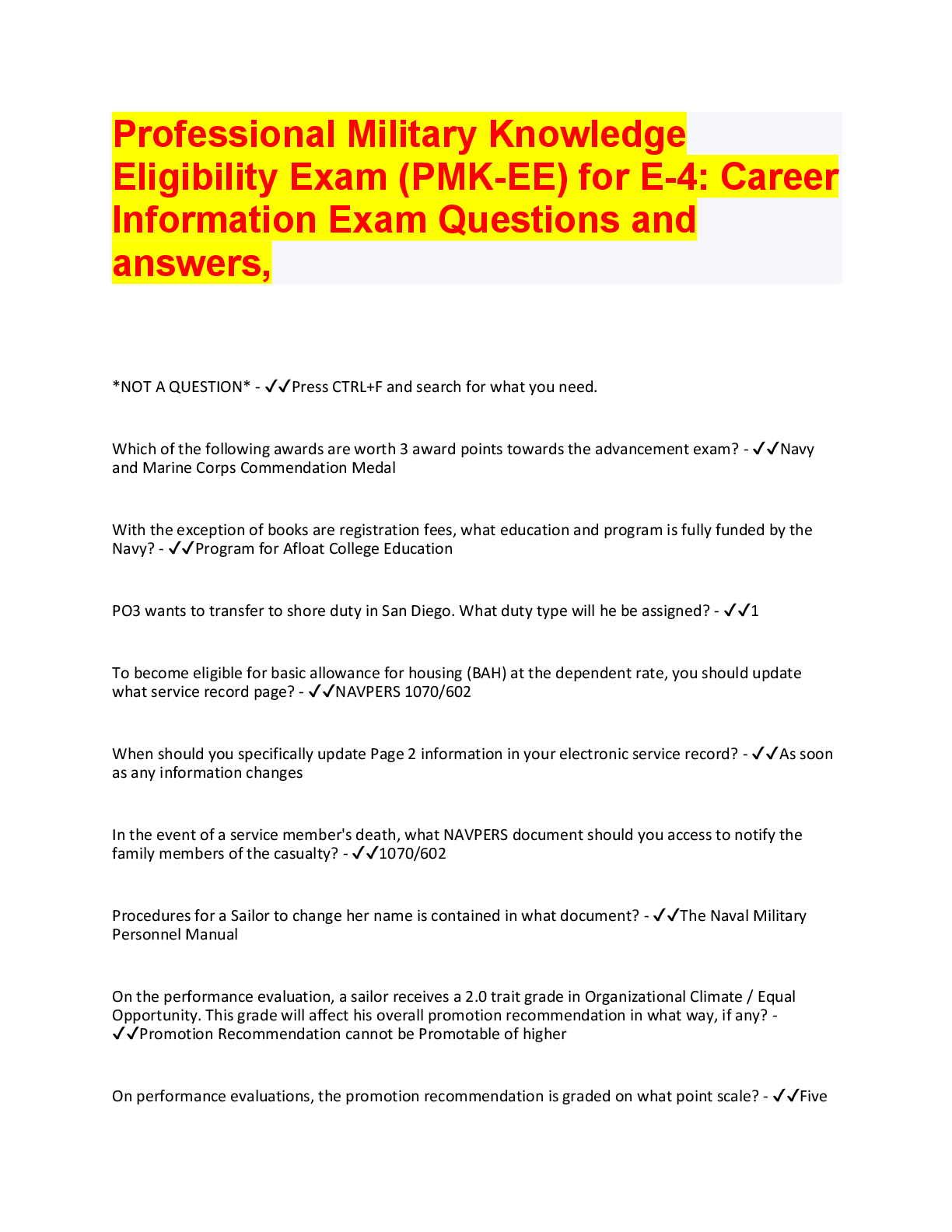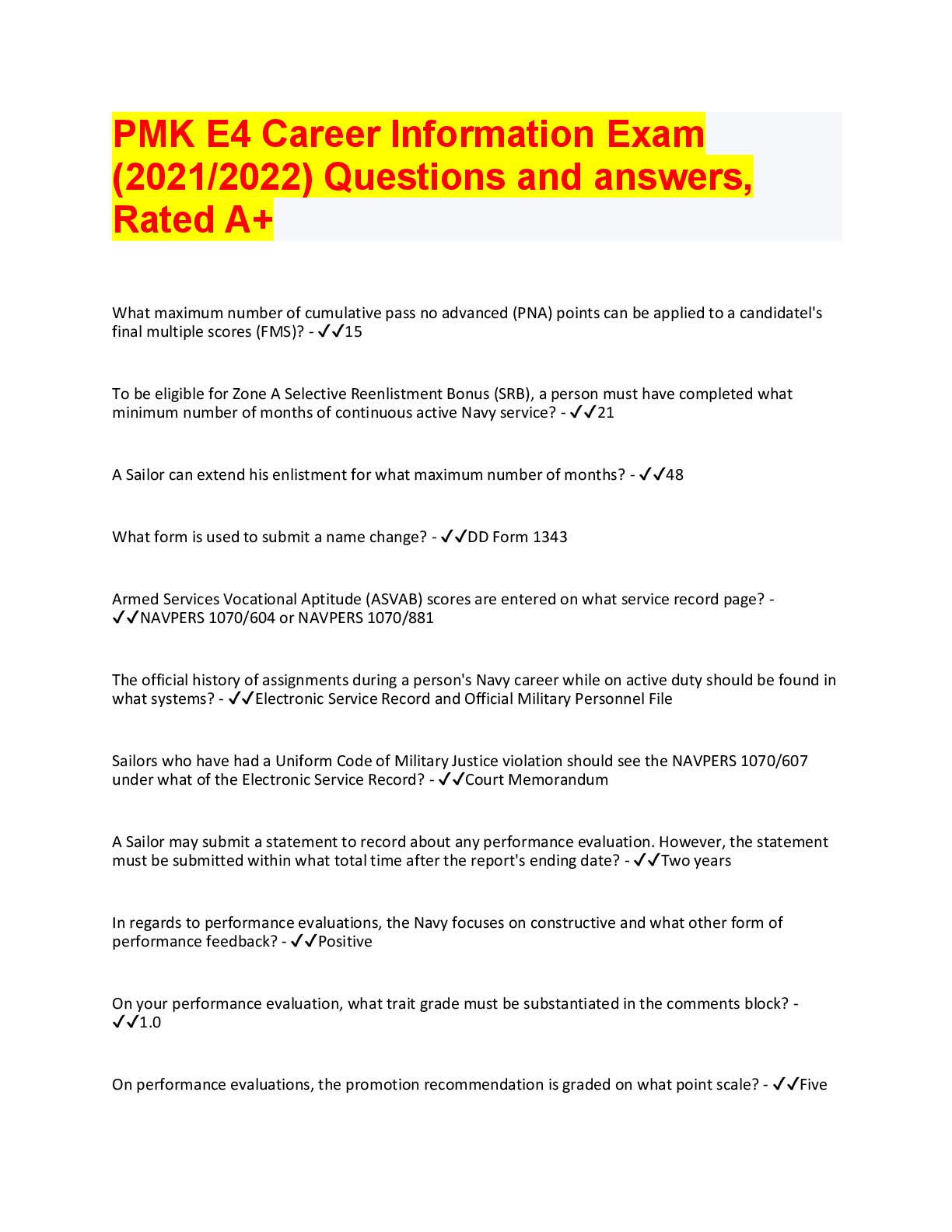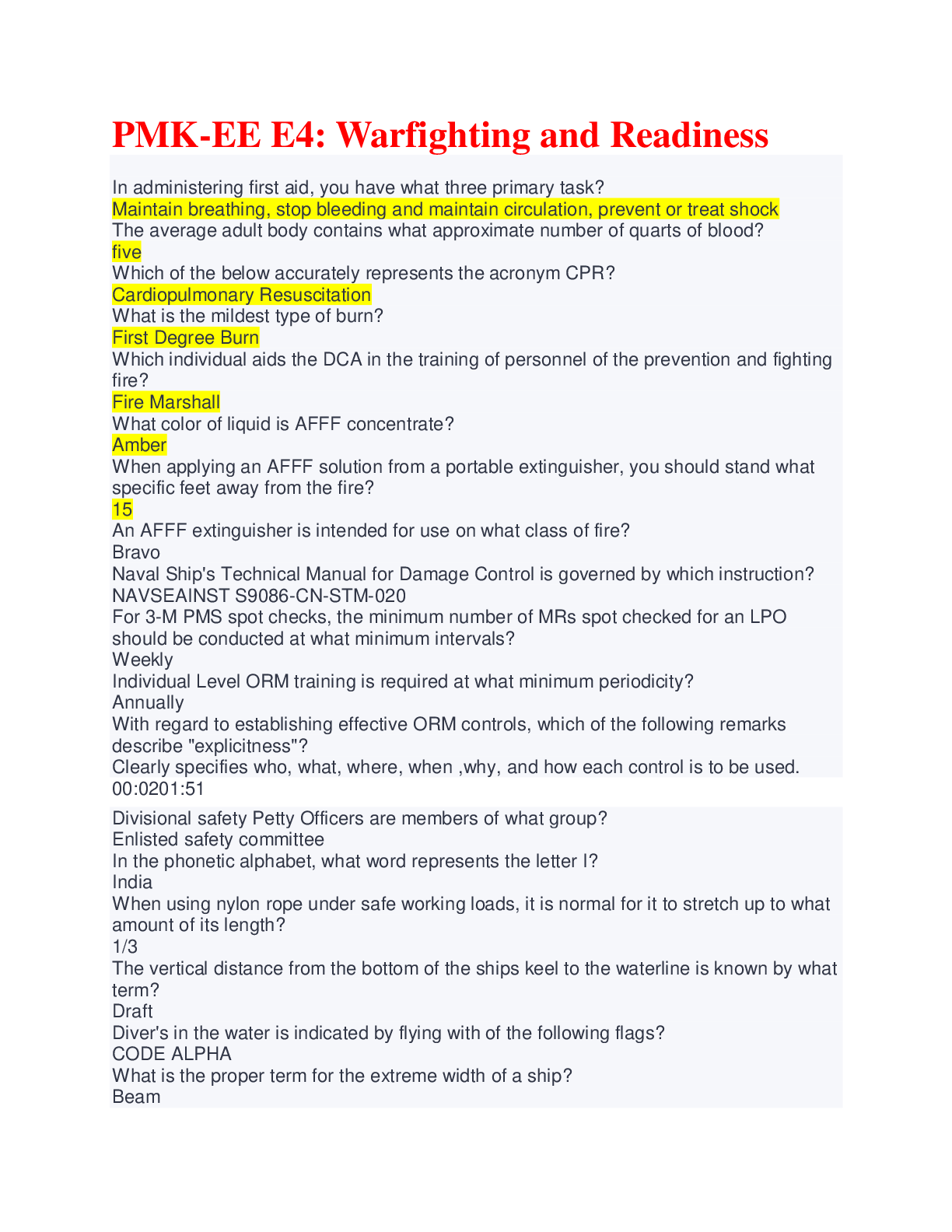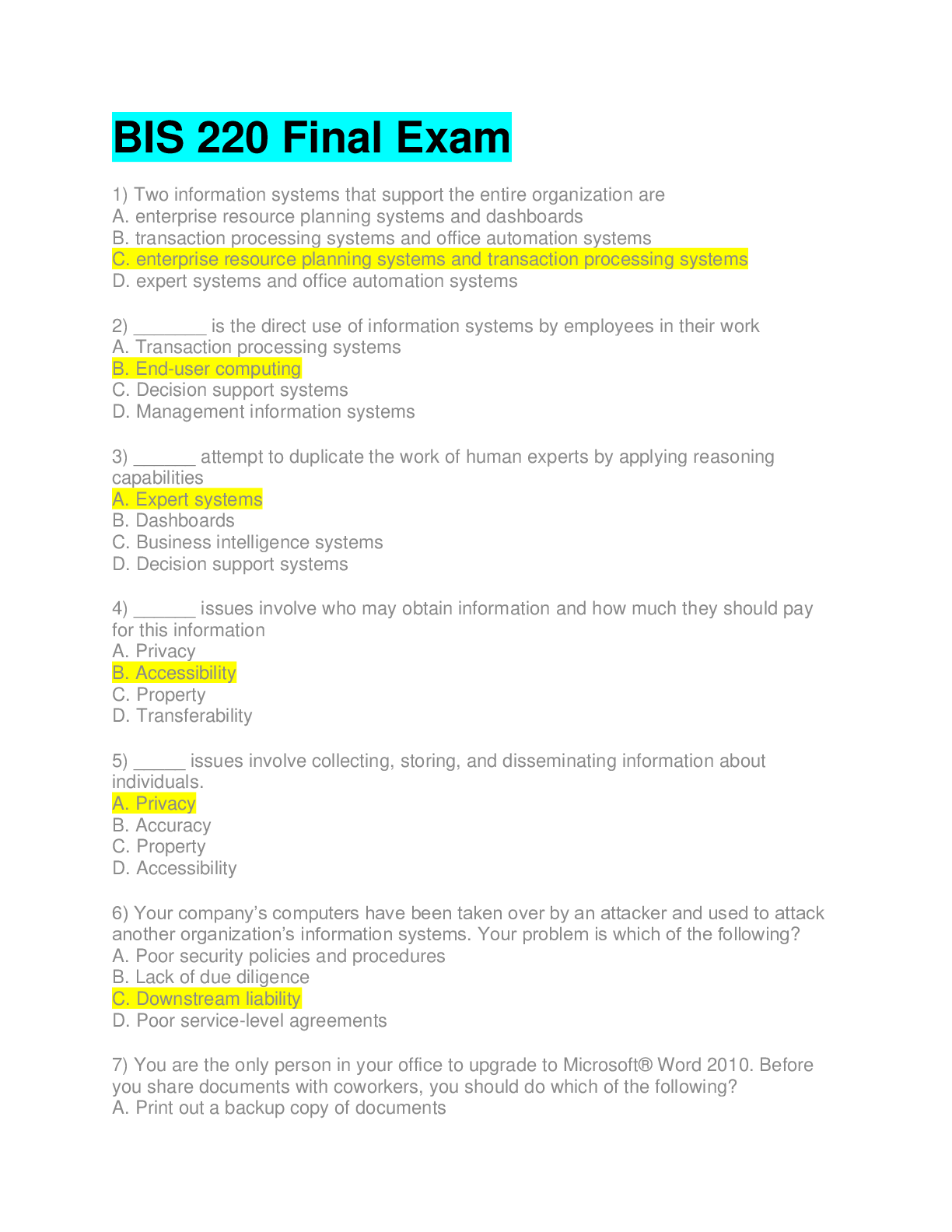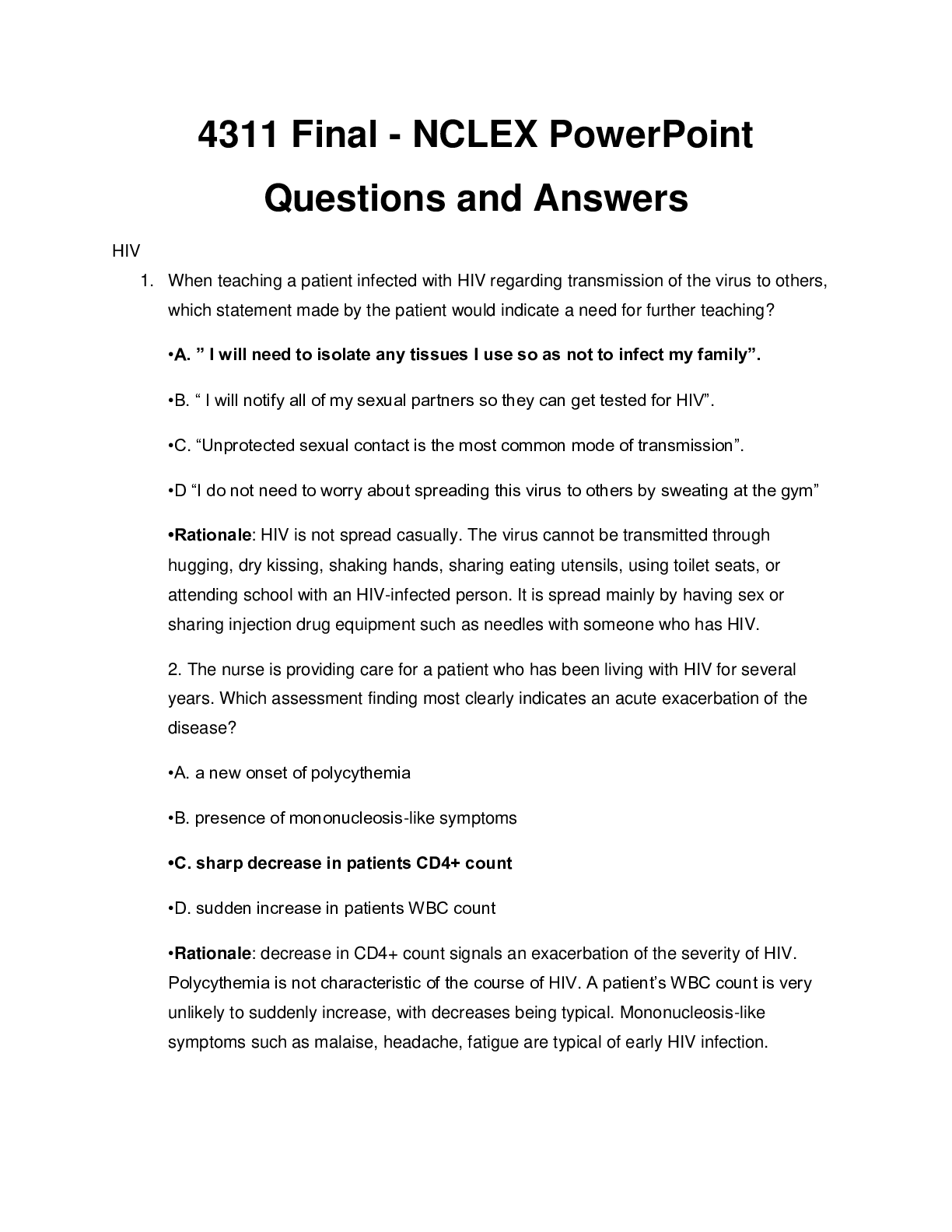History > QUESTIONS & ANSWERS > AP Euro Final Exam Questions and Answers with Verified Solutions (All)
AP Euro Final Exam Questions and Answers with Verified Solutions
Document Content and Description Below
AP Euro Final Exam Questions and Answers with Verified Solutions Black Death (The Plague) ✔✔1347 Genoese sailors carried cargo along with disease-infested rats and fleas with a disease later ca... lled this. Often transmitted person to person- many priests died because cared for the sick. Started with boil, bubo that was a bump the size of a nut or apple and very painful- gave name. Next came bleeding under skin with spots and blotches. Finally person coughed violently and spit blood and death followed in 2 or 3 days. Not enough time, people, and places to bury and properly care for the dead body so disease spread faster. Hundred Years' War ✔✔Conflict between England and France from 1337 to 1453; fought over lands England possessed in France and feudal rights versus the emerging claims of national states. 1259 Treaty of Paris said English king agreed to become vassal of French crown. When Queen Isabella of England killed her husband King Edward II the French barons wouldn't let her son Edward III or her rule the French monarch. Crown given to Philip VI nephew of Philip the Fair and Philip exercised full jurisdiction which Edward III said violated Treaty of Paris. War also became French civil war making it last longer. Both governments supported the war. England lost all its possessions in France except Calais. Both sides death great and because of Black Death. The crisis led to challenges to the Church. Joan of Arc ✔✔French peasant girl and military leader inspired by religious visions to organize French resistance to the English and to have Charles VII crowned king and helped French win key battles in Hundreds Years' War. English captured her and France didn't fight back. English condemned her as a heretic in 1431 and burned her at stake in Rouen marketplace. Babylonian Captivity ✔✔(1309-1376) Philip the Faire pressured Pope Clement V to settle permanently in Avignon, France to control the church and its policies. It weakened the papal prestige.Great Schism ✔✔Italian citizens wanted a new pope in Rome and France wanted Cardinal Robert, cousin of Charles V of France to be pope in Avignon. There were 2 popes, Urban (VI) in Rome and Clement VII (Cardinal Robert) in Avignon. Confusion over which pope was legitimate and broke down piety and the church. 2 popes and division until 1417 John Wycliffe ✔✔English scholar like an early Martin Luther and helped Europe move toward the Reformation. Wrote that papal claims of power were not in the Scriptures and the Scriptures alone should be standard of belief and everyone should read for themselves. Urged abolition of veneration of saints, pilgrims, pluralism and absenteeism. Conciliar Movement ✔✔Reform of the church through general councils representing all Christians. The pope still is the head of the church, but authority is from the Christian community. Solution to the unrest and Schism and called for a new pope. Led rise to Renaissance papacy. Jan Hus ✔✔Czechoslovakian priest like Wycliffe. He denounced superstition, sale of indulgences, and other abuses. He defeated transubstantiation and insisted Church authority derived from the Scripture alone. Secularism ✔✔concern with the material world and not the eternal world of spirit. Want to find the ultimate explanation of everything. New society and wealth allowed material pleasures, comfortable life and time to appreciate the arts. Humanism ✔✔Expansion of learning and emphasized humans and their achievements, interests, and capabilities. Importance of the individual to get an education, study Latin, and wrote to understand human value. Christian ________ believe in education but stress ethical way of life and spiritual and education through church. Individualism ✔✔Stressed personality, uniqueness, genius, and the fullest development of capabilities and talents.Francesco Petrarch ✔✔Known as the father of Renaissance Humanism. He lived from 1304-1374 as a cleric and committed his life to humanistic pursuits and careful study of the classics. He resisted writing in the Italian vernacular and broke from the old Rome glory ages what he called "Dark Ages" into a new golden age of intellectual achievement. Italian Renaissance ✔✔interest in classical antiquity, perfect human form, and high regard for the individual. Papal still hold authority but people turn toward material things and interest in art. Northern Renaissance ✔✔like Christian humanist more interest in biblical and devotional literature, polished the human soul and searched for Christian roots. More ethnic morality, literature, and art. Italian City States ✔✔Power held in Florence by Medici banking family. Central Italy was Papal States. Major states controlled smaller ones competing for territory and created balance of power and modern diplomacy. A lot of oversea and canal transport and trade and Florence capital of banking but most Italians made money through selling wool Venice, Milan, Florence, Naples, Papal States Feudalism ✔✔class structure Rapheal Sanzio ✔✔Florentine who created frescoes (rapid watercolor painting done on wet plaster, walls, and ceilings) in the papal apartments and painted portraits of devotional images. Baldassare Castiglione ✔✔wrote The Courtier (1528) about training the young man into a gentleman. He should be educated in many academic subjects and have spiritual, physical, and intellectual capabilities. Young men should be able to dance, sing, wrestle, ride, do difficult math, and speak and write well. Also talked about perfect court lady but to lesser extent and women too should be educated, play instrument, paint, and have beauty and dress modest. 16th and 17th century translated into all European languages and shaped social mores and patterns.Johann Gutenberg ✔✔invented to movable type- printing press with metal inked up symbols pressed onto the paper Renaissance Women (Laura Creta) ✔✔humanist who defended women's right to education- wrote letters people read, wanted them to paint but not excepted into academies and universities, not allowed to study male nude or sign name for art Thomas More ✔✔wrote Utopia (1516) presents a perfect society in which everyone is equal. Suggests that the basic problems in society are caused by greed, people are corrupt. Desiderius Erasmus ✔✔wrote 'The Praise of Folly' 'The Education of a Christian Prince' believed that education is the means to reform, and the core of education shoud be to study the bible and the classics Rogier Van der Weyden ✔✔Flemish painters used oil based paints successfully, paid attention to personality and were considered equals of Italian painters Jan Van Eyck ✔✔one of earliest artists who used oil-based paintings. 'Ghent Altarpiece' and 'Giovanni Arnolfini and His Bride' show Flemish love for detail War of the Roses ✔✔2 rival houses but also had family power 1455-1471 dual houses of York (white rose symbol) and Lancaster (red rose symbol) civil war, Edward IV defeated the Lancastrians Giotto ✔✔Florentine painter who used realism in treatment of the human body and face Albrect Durer ✔✔German artist used realism and painted many self portraits made many woodcutsCesare Borgia ✔✔son of Pope Alexander VI who aided his father militarily and politically. He became the hero of Machiavelli's "The Prince" he was like a lion and fox and united the peninsula by conquering and demanding total obedience from the people to make the Papal States. Brethern of the Common Life ✔✔Holland common lay people, lived in simplicity, religion = inner experience, taught local schools, Thomas Kempis - the Imitation of Christ Martin Luther ✔✔Augustinian friar who challenged the Catholic Church and the sale of indulgences, 'faith alone, grace alone, scripture alone' 1517 95 thesis on Wittenburg Castle 'On Secular Government' (all Christians should obey their rulers) Charles V ✔✔Holy Roman Empire r. 1519-1556, strong defender of Catholicism, Peace of Augsburg 1555, summoned Luther to appear before Diet of Worms Henry VIII ✔✔King of England r. 1509-1547 Divorced Catherine of Aragon, anne boleyn, used parliament to legalize the Reformation in England, Act of Restraint and Act of Supremacy, dissolved English monasteries, his reign saw the growth of centralized bureaucratic state. Divorced, Beheaded, Died, Divorced, Beheaded, Survived (The Other Boleyn Girl movie) Thomas Cromwell ✔✔Henry VIII's chief minister 1540 he was beheaded Mary I (Tudor) ✔✔England r. 1553-1558 restored Roman Catholicism, executed several hundred Protestant Elizabeth I (Tudor) ✔✔England r. 1558-1603 chose a middle route between Catholicism and Protestantism, required subjects to outwardly practice Catholicism but did not care what the actually believed, Elizabethan Settlement John Knox ✔✔dominated the reform movement in Scotland, established the Presbyterian Church of Scotland, Book of Common OrderUlrich Zwingli ✔✔Swiss humanist, early reformer who preached not from the church's readings but relyed on Erasmus' New Testament and read it from Matthew to Revelations. convinced that christian life rested on the Scriptures and sacraments Protestantism vs. Catholicism ✔✔Salvation: Catholic- free gift from God already saved Protestant- same as Catholic but only if believe in Christ Calvin- free gift predestination only some chosen How to achieve salvation: Catholic- justify faith through good works Protestantism: can't be earned faith necessary but works not needed Calvin- predetermined who is saved works make no difference (but people tried to be good to show others god had chosen them) Source of Divine: Catholic- scripture and tradition Protestantism- scripture only Calvin- scripture only Sacraments: Catholic- 7 sacraments Protestantism- 2 baptism and confirmation Calvin- 2 ordinances, Baptism and Lord's Supper Hapsburg-Valois War ✔✔Italy became good battlefield and easy target of foreign armies like France and Holy Roman Empire conflict to control parts of Italy split into rival states easy prey like a mouse France and Spain (hawks) want supremacy Charles VIII (french) invades Italy and takes Naples- more territorial than religious but religion did play a small role Treaty of Cateau-Cambresis ✔✔end of the Hapsburg-Valois war gives Two Sicilies and Milan to Spain (Philip II) Peace of Augsburg ✔✔A treaty between Charles V and the German Protestant princes that granted legal recognition of Lutheranism Jesuits ✔✔Society of Jesus founded by Ignatius Loyola spread Protestantism through education converting Asians, Latin American Indians to CatholicismGreeks (help shape Western Civilization) ✔✔Philosophical thought and shaping of the human mind, concept of beauty, art, and literature Romans (help shape Western Civilization) ✔✔architecture, law, government, roads, representative government- republican, make calendar Benthamites ✔✔followers of radical philosopher Bentham; believed that public problems should be solved on a rational, scientific basis and acording to the "greatest good for the greatest number" breast-feeding ✔✔mothers increasingly breastfed their own children as opposed to having wet nurses do it Louis Pasteur ✔✔developed the germ theory; discovered that the process of pasteurization degermed beverages like milk, beer and wine Sigmond Freud ✔✔psychoanalyst who developed groundbreaking theories about human mind; id, ego, superego, sexual desire, and subconsious drives Middle Class ✔✔social class that rose to dominance in nineteenth century urban society; included such groups as doctors, merchants, lawyers, etc. Darwin ✔✔developed theories of evolution; applied by Social Darwinists to society to justify "survival of the fittest" illegitimacy explosion ✔✔drastic increase in illegitimate births between 1750 and 1850 realism ✔✔art form that arose in 1840s that strove to portray life exactly as it wasEmile Zola ✔✔realist author; wrote "The Germinal"; was known for his seamy animalistic view of working class life; sympathized with socialism Louis Napoleon ✔✔also known as Napoleon III; elected president in 1848 then voted emperor; successful economy and widespread support; attempted to expand French territory -> lack of support -> progressivly liberalized empire -> new constitution with parliament and hereditary emperor Guiseppe Garibaldi ✔✔Italian nationalist who led guerilla army of "Red Shirts" to conquer much of the Italian penninsula; later turned over all conquered territory to Vicot Emmanuel North German Confdederation ✔✔confederation of northern german states; led by Prussia; in opposition to Austrian influence in the south October Manifesto ✔✔decree issued by the Russian czar following the peasant uprising caused by Bloody Sunday that granted full civil rights and a parliament Congress of Vienna ✔✔Meeting held among the great European powers after Napoleon's defeat; est. conservatism and opposed nationalism Otto von Bismark ✔✔German chancellor who is responsible for the unification of the German confederation into the German State; developed system of alliances throughout Europe zemstvo ✔✔new German institution of government; dealt with local issues; made up of 3-class sys of towns, villages, and noble landowners Duma ✔✔Russian parliament est. in the October Manifesto Reichstag ✔✔popularly elected lower house of the German parliamentGiuseppe Mazzini ✔✔radical Italian patriot who advocated a centralized democratic republic based on universal male suffrage and will of people Austro-Prussian War ✔✔war between Prussia and Austria in 1866; Prussia won and Austria ageed to stay out of German affairs Alexander II ✔✔Russian czar who freed the serfs; other attempts at reform were limited Dreyfus Affair ✔✔the conflict over the false accusation of Alfred Dreyfus, a Jewish captain of the French army Bloody Sunday ✔✔massacre of Russin protesters by Russian troops; sparked peasant uprising that culminated in Ocotber Manifesto Zionism ✔✔the idea a Jewish state should be created; advocated by Theodore Herzl Great Powers ✔✔the strongest European nations; at the onset of WWI they included Germany, France, Great Britain, Russia, and Austria-Hungary Archduke Ferdinand and Sophie ✔✔the Austrian couple that was assasinated by a Serbian nationalist, sparking WWI total war ✔✔a development of WWI; the total mobilization of society for war League of Nations ✔✔later known as the United Nations; a council with representatives of all nations that comes together to discuss international disputes peacefully; advocated in one of Wilson's Fourteen PointsThree Emperor's League ✔✔alliance established by Bismark linking the monarchs of Russia, Germany, and Austria-Hungary trench warfare ✔✔war stradegy establish in WWI that involved the two opposing sides holing up in trenches not far from each other and shooting at each other nonstop; it featured heavy casualties on both sides and little territorial gain Nicholas II ✔✔Russian czar who was overthrown in the Russian revolution; conservative, rejected calls to share power, highly unpopular Treaty of Versailles ✔✔treaty that ended WWI; imposed harsh settlement on Germany (had to accept resposibility and repay all civilian damages), est League of Nations, Balfour Declaration; Triple Alliance ✔✔WWI alliance among Germany, Austria-Hungary, Italy; aka Central Powers Triple Entente ✔✔WWI alliance among Russia, France, Britain Central Powers ✔✔another name for the nations of the Triple Alliance (Germany, AustriaHungary, and Italy) Bolsheviks ✔✔"majority group"; faction of Russian Social Democratic Labor Party that advocated a small elitist party; came to dominate and controlt he Russian government, putting Lenin in power Mensheviks ✔✔"minority group"; faction of Russian Social Democratic Labor Party that advocated a more democratic party; defeated by the Bolsheviks Lusitania ✔✔British passenger ship that was sunk by German submarines, killing 139 Americans and leading to American intervention in the WarLenin ✔✔leader of the Bolsheviks that led them to power; ruled as a repressive totalitarian dictator in Russia for many years Cheka ✔✔tsarist secret police that were re-est under Lenin; hunted down and executed thousand s of real-supposed foes Friedrich Nietzsche ✔✔German existentialist thinker who proclaimed "God is dead"; believed Christianity to be "slave morality," people's only hope was to accept the meaninglessness of life and be liberated by that knowledg [Show More]
Last updated: 2 years ago
Preview 1 out of 32 pages
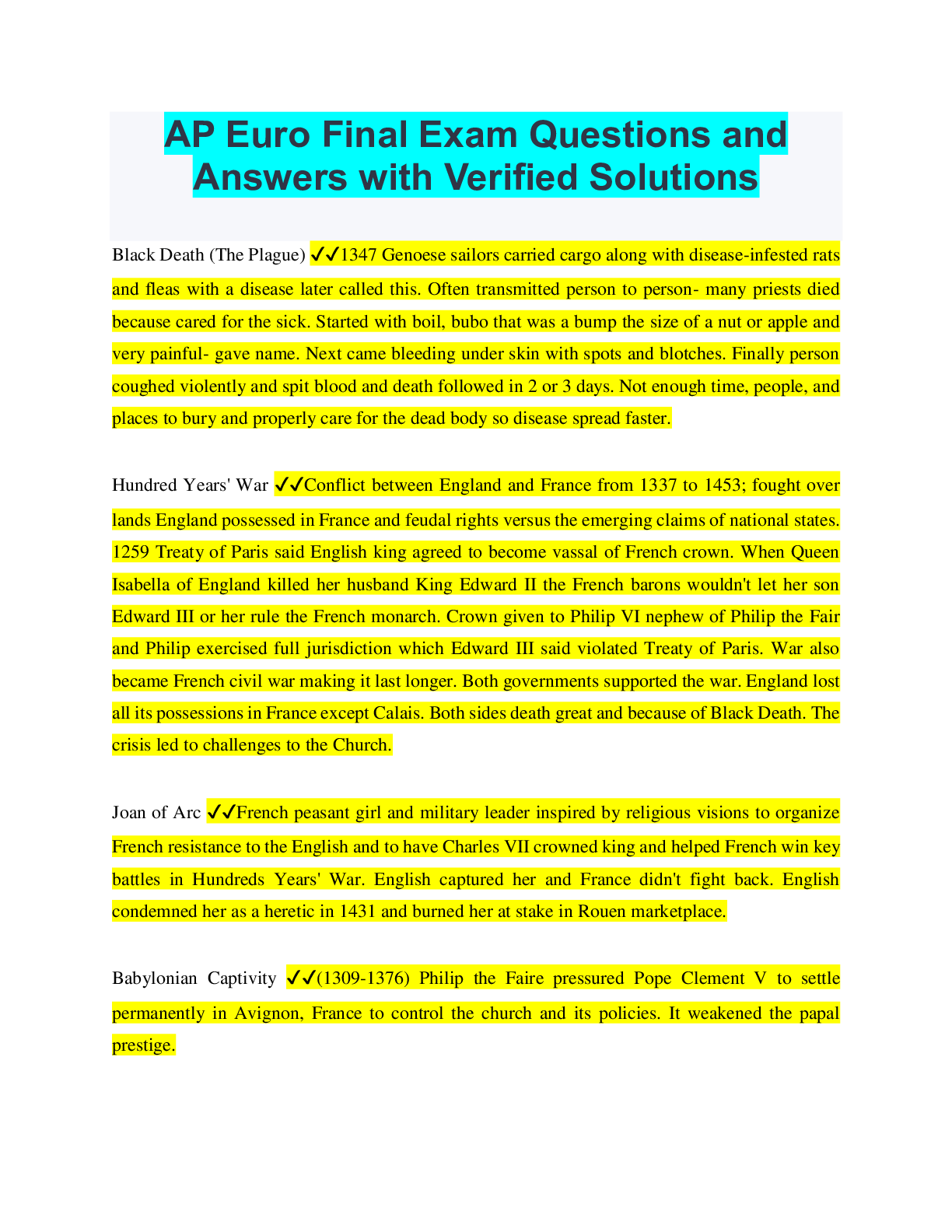
Buy this document to get the full access instantly
Instant Download Access after purchase
Buy NowInstant download
We Accept:

Reviews( 0 )
$8.00
Can't find what you want? Try our AI powered Search
Document information
Connected school, study & course
About the document
Uploaded On
Sep 27, 2022
Number of pages
32
Written in
Seller

Reviews Received
Additional information
This document has been written for:
Uploaded
Sep 27, 2022
Downloads
0
Views
128
